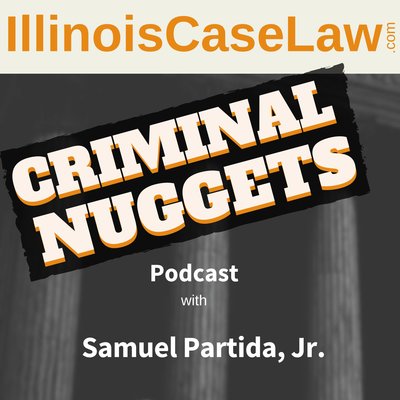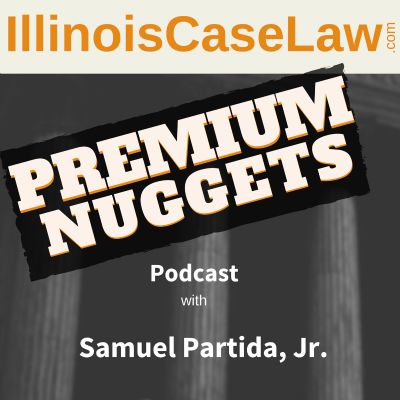Mar 9, 2015
After Aguilar, the fallout for Aggravated Unlawful
Use of a Weapon - 720 ILCS 5/24-1.6 convictions remains consistent.
Some gun convictions will remain valid. However, the Illinois
Supreme Court has recently thrown a bone to the defense bar by
invalidating the sentencing provision which made a nonprobationable
class 4 AUUW.
[powerpress] Subscribe: iTunes | Stitcher | RSS
The Illinois Supreme Court has more to say about AUUW charges. See People v. Mosley, 2015 IL 115872 (02/20/2015).
 People v. Aguilar, 2013 IL 112116 (09/12/2013), was the
watershed case in Illinois that invalidated certain sections of the
AUUW statute.
People v. Aguilar, 2013 IL 112116 (09/12/2013), was the
watershed case in Illinois that invalidated certain sections of the
AUUW statute.
A quick summary of some of twists and turns that followed the case include:
- Upholding UUW Felon Cases
- Reversal of Convictions With AUUW Predicate Offenses
- Upholding No FOID convictions
- Upholding Gun Cases Against Minors
- Split in the Districts in How AUUW by a Felon Cases are Treated
Lets look at what the Illinois Supreme Court is doing now.
Facts
The story here is not uncommon for a gun charge.
19 year old defendant is approached in a park by police. He runs away. During the run he drops a loaded revolver from around his waistband.
Police recover the gun and arrest Defendant.
Defendant is charged with and convicted of multiple counts of aggravated unlawful use of a weapon charges.
The Charges
The Illinois Criminal Code Aggravated Unlawful Use of a Weapon Aggravated Unlawful Use of a Weapon - 720 ILCS 5/24-1.6 (AUUW) section provides that:
(a) A person commits the offense of aggravated unlawful use of a weapon when he or she knowingly:
(1) Carries on or about his or her person or in any vehicle or concealed on or about his or her person except when on his or her land or in his or her abode, legal dwelling, or fixed place of business, or on the land or in the legal dwelling of another person as an invitee with that person’s permission, any pistol, revolver, stun gun or taser or other firearm; or
(2) Carries or possesses on or about his or her person, upon any public street, alley, or other public lands within the corporate limits of a city, village or incorporated town, except when an invitee thereon or therein, for the purpose of the display of such weapon or the lawful commerce in weapons, or except when on his or her own land or in his or her own abode, legal dwelling, or fixed place of business, or on the land or in the legal dwelling of another person as an invitee with that person’s permission, any pistol, revolver, stun gun or taser or other firearm; and
(3) One of the following factors is present: (A) the firearm possessed was uncased, loaded and immediately accessible at the time of the offense; or *** (C) the person possessing the firearm has not been issued a currently valid Firearm Owner’s Identification Card; or *** (I) the person possessing the weapon was under 21 years of age and in possession of a handgun as defined in Section 24-3, unless the person under 21 is engaged in lawful activities under the Wildlife Code or described in subsection 24-2(b)(1), (b)(3), or 24-2(f).
***
(d) Sentence.
(1) Aggravated unlawful use of a weapon is a Class 4 felony; ***
(2) Except as otherwise provided in paragraphs (3) and (4) of this subsection (d), a first offense of aggravated unlawful use of a weapon committed with a firearm by a person 18 years of age or older where the factors listed in both items (A) and (C) of paragraph (3) of subsection (a) are present is a Class 4 felony, for which the person shall be sentenced to a term of imprisonment of not less than one year and not more than 3 years.”
Summary of Charges
Here is a summary of the charges against defendant.
“The State charged defendant in count I with UUW in a public park (720 ILCS 5/24-1(a)(10) (West 2012)), and with six counts of AUUW: count II, carrying on his person or in any vehicle, outside the home, a firearm which is “uncased, loaded and immediately accessible” (720 ILCS 5/24-1.6(a)(1), (a)(3)(A) (West 2012)); count III, carrying on his person or in any vehicle, outside the home, a firearm without a valid FOID card (720 ILCS 5/24-1.6(a)(1), (a)(3)(C) (West 2012)); count IV, carrying on his person or in any vehicle, outside the home, a firearm which is “a handgun” while under 21 years of age unless “engaged in lawful activities under the Wildlife Code” (720 ILCS 5/24-1.6(a)(1), (a)(3)(I) (West 2012)); count V, carrying or possessing on his person, upon any public way, a firearm that is “uncased, loaded and immediately accessible” (720 ILCS 5/24-1.6(a)(2), (a)(3)(A) (West 2012)); count VI, carrying or possessing on his person, upon any public way, a firearm without a valid FOID card (720 ILCS 5/24-1.6(a)(2), (a)(3)(C) (West 2012)); and count VII, carrying or possessing on his person, upon any public way, a handgun while under 21 years of age unless “engaged in lawful activities under the Wildlife Code” (720 ILCS 5/24-1.6(a)(2), (a)(3)(I).” ¶ 6
Table Summarizing Charges
|
AUUW Subsections Under Which Defendant Was Convicted |
||
|
720 ILCS 5/24-1.6 |
(a)(1)-Person or Vehicle |
(a)(2)-Public Way |
|
(a)(3)(A)-Uncased, Loaded |
Count II |
Count V |
|
(a)(3)(C)-No FOID Card |
Count III |
Count VI |
|
(a)(3)(I)-Under 21 & Not Hunting |
Count IV |
Count VII |
Count I was the misdemeanor “NO FOID” section under 720 ILCS 5/24-1(a)(10).
Constitutionality of Aggravated Unlawful Use of a Weapon - 720 ILCS 5/24-1.6 Sections
I have already mentioned People v. Aguilar, 2013 IL 112116 (09/12/2013). This was the watershed case in Illinois that invalidated certain sections of the AUUW statute.
The fallout since that decision have largely remained consistent with a few twists and turns along the way. However, in this decision the conclusions remain straight forward.
Certain sections of the AUUW statute remain unconstiutional. Yet, some sections remain valid and good law.
A summary of the Illinois Supreme Court’s findings in this case is summarized below in the table.
Table Summary of Court's Findings
|
AUUW Subsections Under Which Defendant Was Convicted |
||
|
720 ILCS 5/24-1.6 |
(a)(1)-Person or Vehicle |
(a)(2)-Public Way |
|
(a)(3)(A)-Uncased, Loaded |
Count II: |
Count V: |
|
(a)(3)(C)-No FOID Card |
Count III: VALID |
Count VI: VALID |
|
(a)(3)(I)-Under 21 & Not Hunting |
Count IV: VALID |
Count VII: VALID |
- Count II was the exact charge under scrutiny in Aguilar. No surprises. It remains unconstitutional in this case.
- Count V was found to be unconstitutional as a logical extension of the holding in Aguilar.
One of the most important points after Aguilar is the fact that some provisions of the AUUW statute remained constitutional, valid crimes. Again, there are no surprises here and the
Illinois Supreme Court again concluded that certain convictions were going to be upheld against Defendant.
In upholding the remaining counts as valid convictions the court found that “the FOID card requirement of subsection (a)(3)(C) is consistent with this court’s recognition that the second amendment right to possess firearms is still ‘subject to meaningful regulation.’” Quoting Aguilar, 2013 IL 112116, ¶ 21.
- Thus, Counts III and Counts VI convictions were upheld.
In regard to minors possessing guns, the court concluded “that where ‘the possession of handguns by minors is conduct that falls outside the scope of the second amendment’s protection’’ Quoting Aguilar, 2013 IL 112116, ¶ 41.
Nonprobationable Sentencing Provision for Class 4 Convictions
AUUW section 24-1.6(d)(2) creates a nonprobationable class 4 offense when the defendant
- Was 18 years old or older
- Had an uncased, loaded weapon AND
- Not issued a FOID card
As far as I know, this is the only nonprobationable class 4 offense in Illinois. The Illinois Supreme Court pretty easily struck down that provision as a logical extension of Aguilar.
The court found “that section (d)(2) is invalid, as it incorporates subsection (a)(3)(A), found to be unconstitutional in Aguilar.” ¶ 52.
The Court said that because subsection (a)(3)(A) has been found unconstitutional, the requirements for sentencing under subsection (d)(2) cannot be met, as a statutory section cannot be “present” if it is void ab initio. Citing In People v. Blair, 2013 IL 114122, ¶ 28.
Since, one part of (d)(2) was invalid from the beginning, the entire sections has to be invalidated “ as it requires a conviction based upon an unconstitutional and unenforceable statutory section.” ¶ 55.
Final Remarks
This is not entitled as a comprehensive summary of the state affairs after People v. Aguilar. That may be something that happens down the road.
The main objective was today was to do a limited recap of Aguilar but more importantly to announce the death of Illinois’s class 4 nonprobationable sentencing provision.
It was crazy to believe that the great State of Illinois ever had a nonprobationable class 4 offense. That's crazy. Especially this felony. The Illinois Supreme Court, in Aguilar, confirmed that these actions were not even crimes, but you could have gone to prison for that very conduct!



